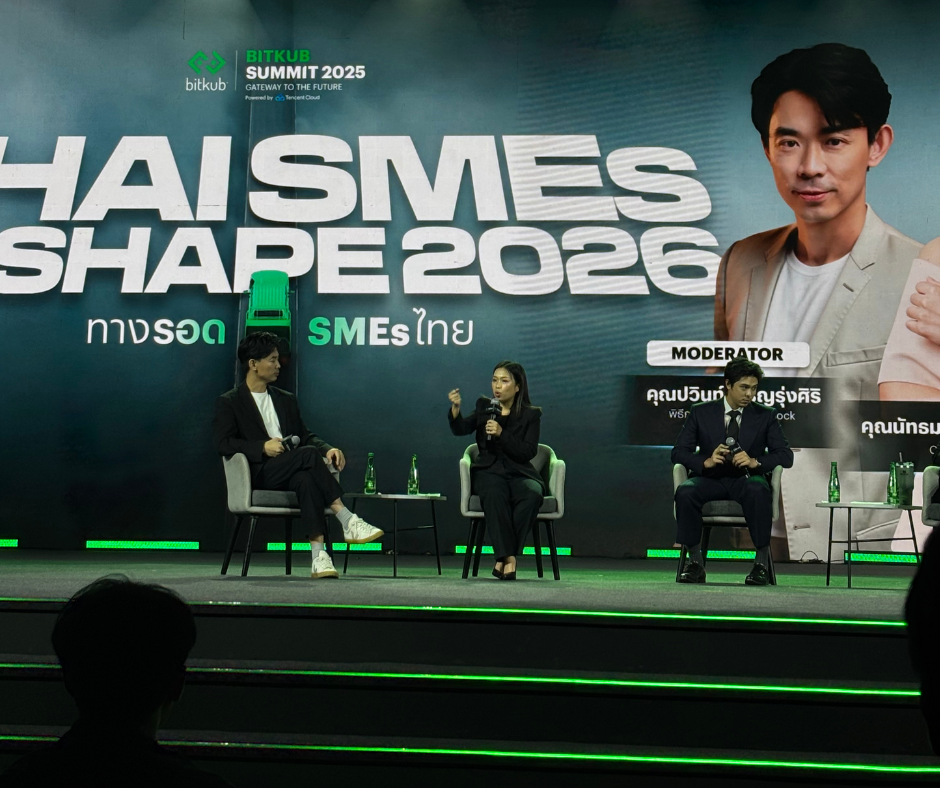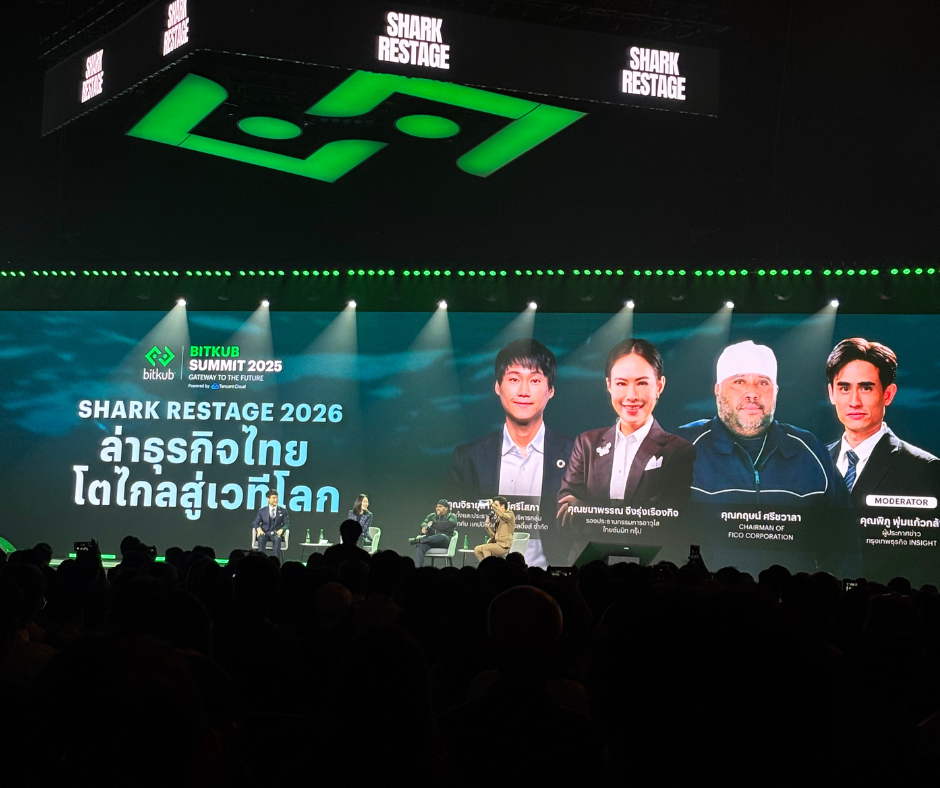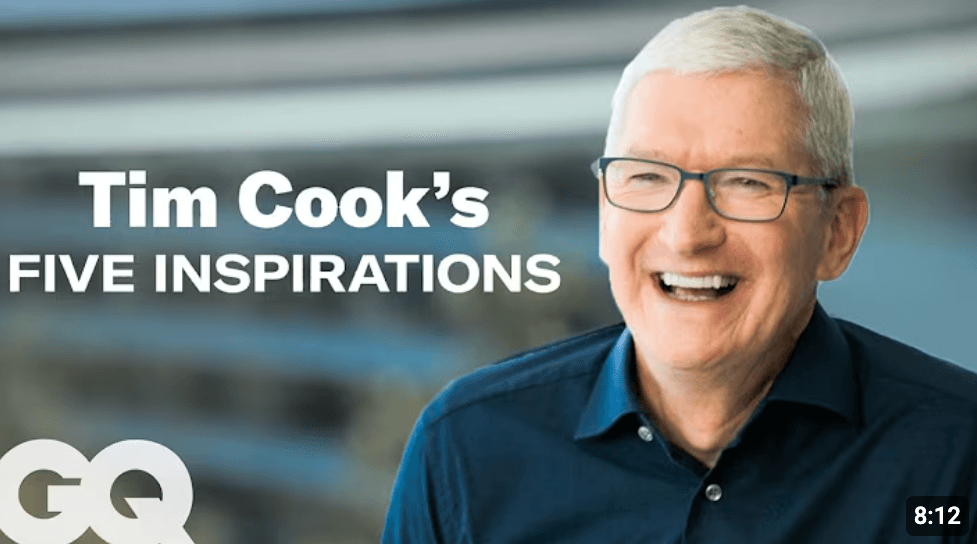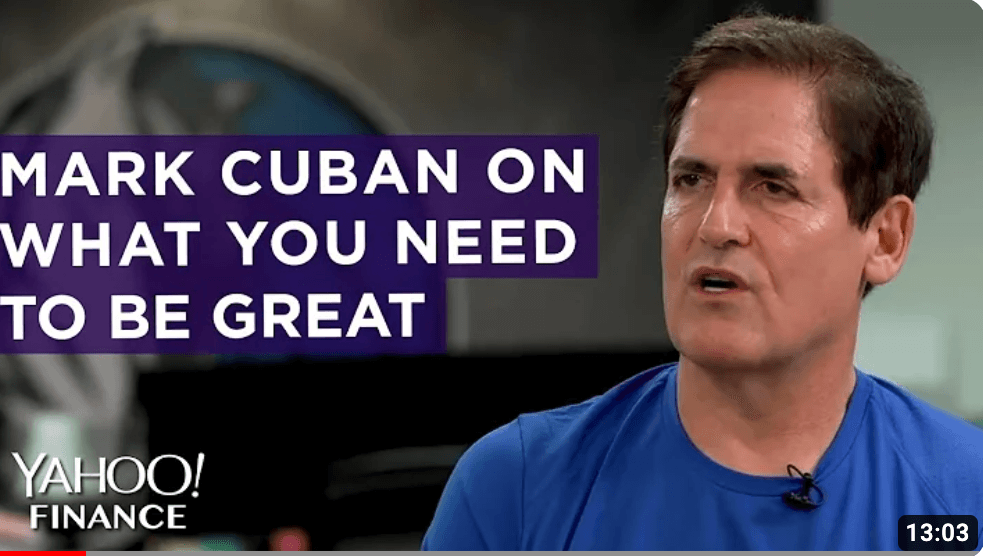“Understand people beyond technology, and change before the world changes you”
Posted on October 28, 2025
Inspiration
Tags:
.png&w=3840&q=85)
This was the key message from two major stages at Bitkub Summit 2025. In an age where the business world is evolving faster than ever, survival is no longer about how much capital you have, but about how well you understand people and how bravely you adapt.
The two highlight sessions, Shark Restage 2026 and Thai SMEs Reshape 2026, revealed powerful lessons from both new-generation and seasoned Thai business leaders: that the true path forward for Thailand’s economy lies in creating value, not competing on price.
Panel Discussion: Thai SMEs Reshape 2026 – “The Path Forward for Thai Entrepreneurs”
At this year’s Bitkub Summit 2025, one of the most talked-about sessions was Thai SMEs Reshape 2026, featuring Thailand’s most inspiring SME founders who have thrived in hyper-competitive “Red Ocean” markets:
K.Fern Nattamon – Founder of Suki Teenoi
K.Peach Pachara – Co-Founder of Potato Corner Thailand
K.Pao Peeradon – Founder of iHAVECPU
K.Warittha – Founder of MizuMi
Suki Teenoi: From Local Buffet to 9-Billion-Baht Brand

What began as a small buffet restaurant has now become a 9-billion-baht business in just eight years. K. Fern shared that her biggest turning point came when she realized she didn’t want to just “own a restaurant,” but to build a sustainable business that grows alongside her people.
“We can’t stand still because there are hundreds of lives growing with us.”
Today, Suki Teenoi continues its expansion across Northeastern Thailand, with plans to launch in the South next year. Despite the fast growth, Fern humbly admits,
“We’re not successful yet, the challenge is how to grow sustainably. We don’t just want to follow a trend. We want to be a brand that stays in people’s hearts for decades.”
Potato Corner: Localizing a Global Brand

From actor to franchise entrepreneur, K.Peach Pachara never imagined that what started as a “fun project with friends” would become a serious business venture.
He quickly learned that running a global franchise requires deep localization to succeed in the Thai market.
“Even though the original Potato Corner has four main flavors, we developed new ones locally to perfectly match Thai tastes.”
K.Peach emphasized that while his public image may have helped early on, true brand strength must stand independently:
“One day, if I’m not here, the business must still go on, that’s what a real brand is.”
iHAVECPU: Building from Scratch with Authenticity

K.Pao Peeradon represents the spirit of a self-made entrepreneur. Starting with nothing but a dream of financial freedom, he acted immediately on what he loved, building computers.
Instead of competing on price, he focused on trust and value, offering pre-assembled, ready-to-use PCs, creating the idea of “instant PCs” before the market caught on.
“I don’t compete on price; I compete on credibility.”
His authentic livestreams, which feel more like friendly conversations than sales pitches, helped build massive trust. Today, iHAVECPU earns over 2.7 billion baht in annual sales.
“A CEO must always be hands-on first, that’s how you earn trust from both customers and your team.”
MizuMi: The Skincare Brand That Grew Slowly, But Surely

From a corporate employee to the founder of a Thai skincare brand competing in one of the toughest Red Ocean markets, K.Warittha (Nui) began with one simple belief:
“Thais can create world-class skincare brands.”
She launched with a single hero product “MizuMi sunscreen” to build instant brand recall.
“We want to be a Thai brand that people remember and feel proud to stand beside global names.”
MizuMi’s rise took five years of careful planning. Warittha focused on Quality Over Speed, doing everything in-house, from R&D to marketing.
Now, MizuMi integrates AI marketing tools to rapidly produce visuals and content tailored to younger audiences.
Finding the “Blue in the Red Ocean”
All four founders shared a common strategy: find the gap where competitors aren’t looking and add unique value.
1.iHAVECPU – “Blue in Red Ocean”
K. Pao avoids price wars by focusing on education-based content and authenticity through livestreaming — selling without “hard selling.” Customers may not buy immediately, but they remember him when they’re ready.
2.Potato Corner – Localization and R&D
Peach emphasized that the Thai market is unlike any other. His team conducted local R&D, tested flavor preferences, and developed bold in-house marketing campaigns to stand out.
3.MizuMi – Quality Over Price
Warittha built trust through Japanese-grade formulations and dermatological testing. Accessibility, consistency, and quality formed the brand’s foundation — growing steadily rather than rushing trends.
AI & Technology: Tools That Empower, Not Replace
All four leaders agree that AI should enhance human potential, not replace it.
Suki Teenoi: Uses POS and back-office systems to reduce fraud and optimize staffing.
MizuMi: Employs AI for marketing visuals, character design, and creative generation.
iHAVECPU: Integrates AI and ERP for customer service, purchasing, and logistics.
Potato Corner: Uses AI to simulate campaigns and reduce design costs before launch.
Final Reflections
When asked, “If you could start over, would you choose the same business again?”
All four answered the same: “Yes.”
“Business is exhausting and risky, but we love what we do and that’s what keeps us going.”
Advice from 4 Leading Thai Entrepreneurs
Peach Pachara: “This is the best time for SMEs to grow fast. Don’t be afraid and stay agile and take action.”
Warittha): “Adapt quickly, learn fast, and analyze your risks.”
Pao Peeradon: “Competition is intense — stand out and never stop developing yourself.”
Fern Nattamon: “Be clear about your purpose. That goal is what keeps you from giving up.”
“Thai SMEs Reshape 2026” is more than a knowledge-sharing platform — it’s proof that success isn’t just about passion, but about discipline, courage, and the ability to see opportunities others overlook.
“In business, success doesn’t belong to those who start first — but to those who refuse to quit first.”
Panel Highlight: Shark Restage 2026 – Evolving Thai Businesses for the Global Stage

Another major highlight of Bitkub Summit 2025, Shark Restage 2026, brought together three powerhouse leaders: K.Chanapun Juangroongruangkit, K.Krit Srichawla, and K.Topp Jirayut Srupsrisopa to discuss the transformation of Thailand’s economy and what it takes for businesses to scale globally.
Thailand’s Economy: “Hurting Longer, Healing Slower”
Krit Srichawla described Thailand’s current economic condition as “slow pain” with liquidity tightening, the real estate sector stalling, and heavy financial regulations dampening market flow.
He compared it to past crises, saying that while events like the Tom Yum Kung and COVID-19 crises were severe, recovery then was swift. Now, the pain is milder but prolonged.
In contrast, K.Topp Jirayut offered a bold warning:
“This year might be the best year we’ll have because after this, things could decline further.”
He noted that “Old Economy” sectors are losing their premium, while Digital and AI-driven economies are rapidly expanding.
Without reskilling the workforce, Thailand risks slipping into a downward spiral driven by price competition and demographic decline — with births falling to just 400,000 per year, cutting consumption nearly in half.
Aging Society: Finding Opportunity in Demographic Shifts
K.Krit highlighted that as Thailand becomes an aging society, opportunities still exist — but in new consumer behaviors.
“People now spend more on health, wellness, and sustainability than on luxury.”
Thus, sectors like Wellness, Longevity, and Health are emerging as Thailand’s new growth engines.
K. Topp added that wellness tourism could become Thailand’s next high-value export:
“Young people today don’t drink or smoke — they run, sauna, and care about wellbeing. If we design businesses for them, we can create a new S-Curve for the nation.”
From Old Economy to New Economy – Lessons from China
K.Chanapun Juangroongruangkit pointed to China and Indonesia as models of successful economic transition.
China built a robust digital infrastructure before scaling industries, while Indonesia used its natural resources like nickel for value-added production instead of raw export.
“Thailand exports rubber but if we bring in investors to process it into innovation, we can evolve from raw material suppliers to value creators.”
The DNA of Thai Entrepreneurs on the Global Stage
The panelists agreed that the Thai DNA offers unique advantages for global success:
Hospitality & Service Mind: A distinct Thai strength that AI can’t replicate — emotional intelligence and genuine warmth.
Market Understanding & Supply Chain Readiness: Essential for global scaling and resilience amid trade and geopolitical shifts.
Thai Authenticity: The cultural charm that sets Thai brands apart internationally.
Top 3 Industries for the Future
1.Health & Longevity – K.Topp sees this as Thailand’s strongest pillar amid a super-aging society.
2.Green Energy / Climate Tech – K.Chanapun believes this is where values-driven consumers will shape the market.
3. Lifestyle Sports – K.Krit foresees a rise in leisure and active living as AI frees up human time.
Life Lessons and Turning Points
K.Krit reflected that failure is part of the entrepreneurial journey “you sleep and wake through it.” The key is awareness and adaptability.
K. Chanapun shared, “No one runs a business for 30 years without mistakes. The goal is to make every mistake a quality one — fail, but improve.”
She added: “The courage to leave what’s not right, to find what is — that’s the real turning point.”
K.Topp admitted to past struggles with cash flow and timing, but summarized his philosophy powerfully: “It’s not about who comes first, it’s about who stays the longest.”
If Thailand follows the right macro trends and endures, success will follow.
Conclusion
Both panels — Thai SMEs Reshape 2026 and Shark Restage 2026 underline a shared truth:
For Thai businesses to thrive on the global stage, they must embrace change, value innovation, and never lose sight of what makes them uniquely Thai — their understanding of people.
“The future belongs to those who can see opportunity in crisis and act when others hesitate.”
Follow more inspiring stories about careers and business at Jobcadu.
%2520(1).png&w=3840&q=75)
.jpg&w=3840&q=75)
.png&w=3840&q=75)
%2520copy%252021.png&w=3840&q=75)





